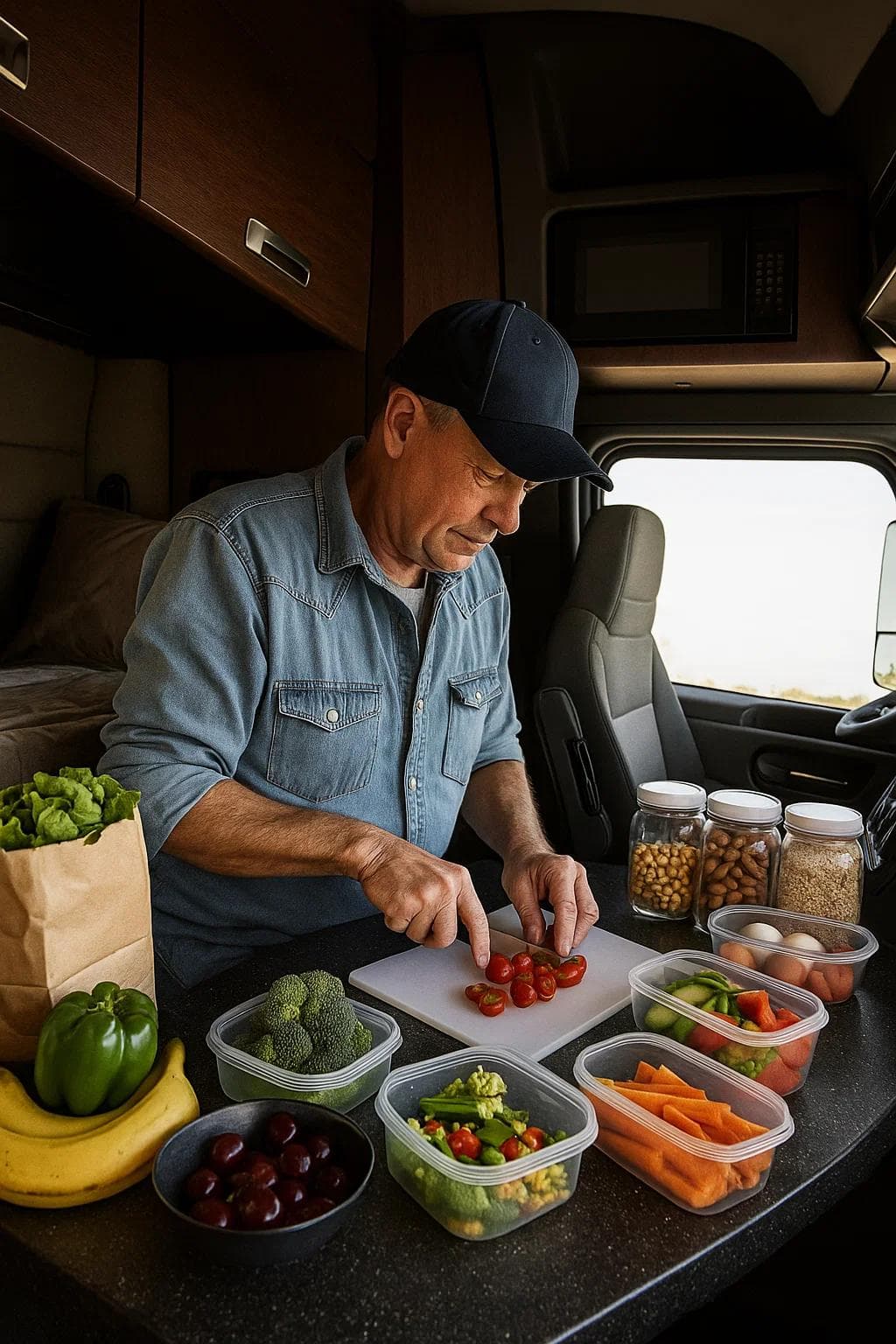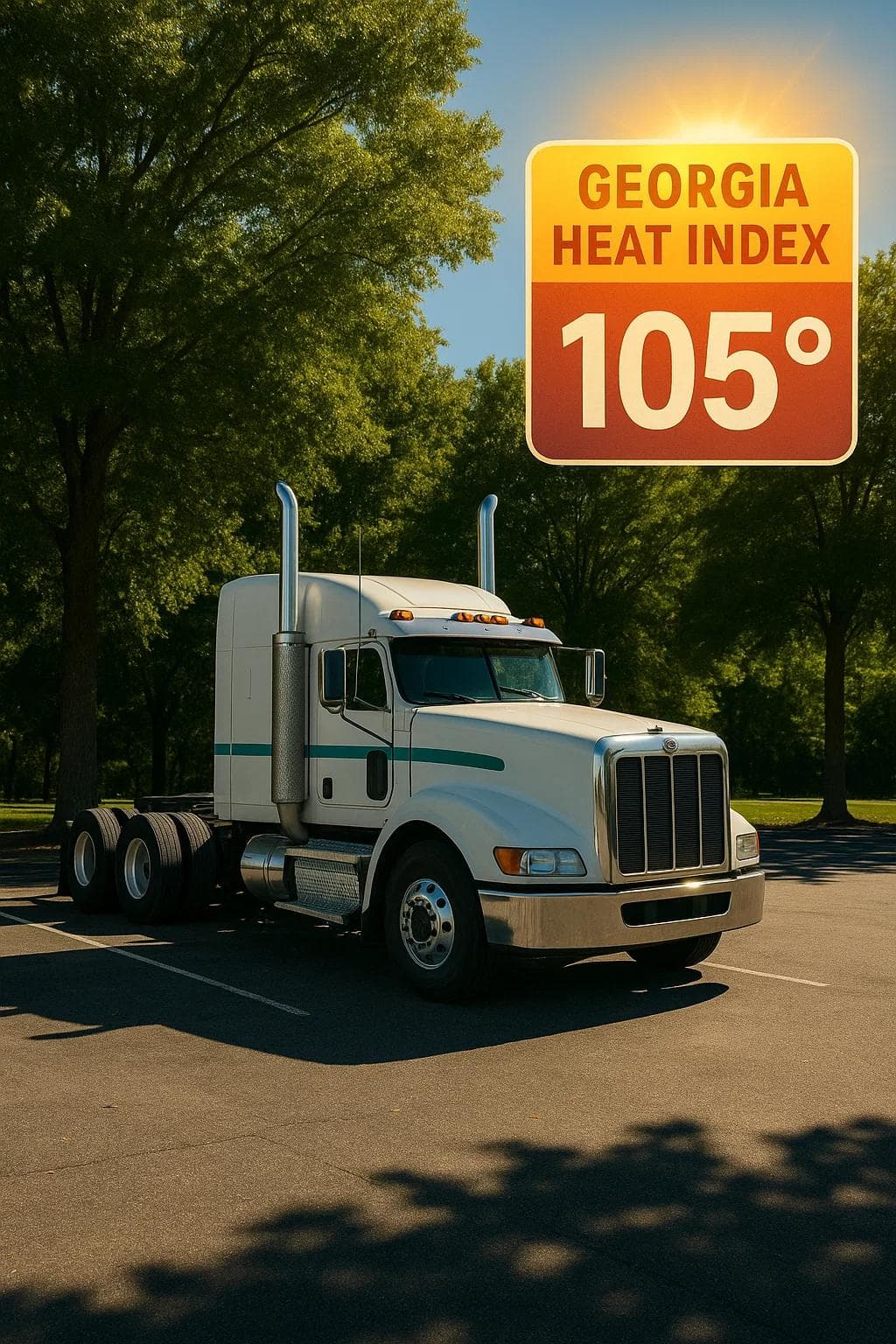
Introduction
According to CDC research, roughly 69% of long-haul truck drivers meet the criteria for obesity—more than double the rate seen in the general workforce. Long hours, irregular schedules, and limited access to fresh food create a perfect storm that undermines energy, alertness, and long-term health.
Parking location is a surprisingly powerful lever. If you park where the only option is fast food and convenience snacks, your choices narrow fast. That affects your ability to pass the DOT physical, stay insured affordably, and keep driving for the long haul. On the other hand, choosing parking near grocery stores and healthier restaurants makes better habits almost automatic.
Superior Truck Parking in Calhoun, GA places drivers close to nutritious options and safe spaces for movement. With healthcare costs climbing and fleets focusing more on driver wellness, strategic parking and smart planning can help you feel better today and protect your career tomorrow.
Check Out Driver Wellness GuidesThe Truck Driver Nutrition Challenge
Industry Health Statistics
Compared to other workers, professional drivers face outsized health risks that can interfere with safety and certification:
- Obesity among drivers is nearly twice that of the general workforce.
- Type 2 diabetes is about two times more prevalent.
- Higher risk of heart disease and hypertension impacts stamina and recovery.
- Sleep apnea is common and worsened by excess weight, reducing alertness.
- Life expectancy can be shortened by years without lifestyle changes.
- Weight, blood pressure, and A1C issues can threaten DOT medical certification.
- Health risks push insurance premiums higher for drivers and carriers.
Common Dietary Pitfalls
These patterns show up on the road again and again:
- Speed over nutrition: drive-thru dependence.
- Irregular meals: long gaps lead to overeating later.
- Portions too large: value meals add hundreds of extra calories.
- Dehydration: avoiding water to cut bathroom stops hurts focus.
- Stress snacking: sugar and ultra-processed foods to “push through.”
- Limited fresh options: many stops are “food deserts.”
- Budget strain: fast food seems cheap but adds up weekly.
Parking Location Impact
Where you park sets the menu:
- “Food desert” stops force convenience-store meals.
- Safe sidewalks and short walks expand choices to healthier spots.
- Close proximity to grocery stores enables real meal prep.
- Access to microwaves, coolers, and storage at facilities supports fresh eating.
- Positive peer influence at wellness-minded lots beats junk-food habits.
Building a Trucker-Friendly Nutrition Plan
Realistic Meal Planning
A simple, repeatable system keeps you fueled without fuss:
- Weekly prep session: 60–90 minutes to batch protein, grains, and veg.
- Portable picks: tuna packets, Greek yogurt, fruit, baby carrots, nuts.
- Non-perishable backups: oatmeal cups, peanut butter, whole-grain crackers.
- Cooler optimization: stackable containers; “ready-to-eat” shelf on top.
- Microwave creativity: steam-in-bag veggies, rice cups, pre-cooked proteins.
- Budget tracking: set a weekly food cap and log receipts.
- Time-savers: buy pre-cut produce; use store pickup to skip lines.
Sample day: Overnight oats (breakfast) → Grilled chicken wrap + apple (lunch) → Brown rice, mixed veg, and salmon pouch (dinner) → Almonds + yogurt (snacks) → Water every 2 hours; one coffee or unsweet tea as desired.
Download Meal Plan TemplatesEssential Equipment
Small investments make healthy eating practical in the cab:
- 12V cooler or compact fridge ($100–$300).
- Portable microwave (truck-safe) ($80–$150).
- Electric skillet or hot plate ($30–$60).
- BPA-free storage containers with tight lids.
- Water filtration bottle/pitcher.
- Reusable utensils, cutting board, paring knife.
- Paper towels, sanitizer, and dish soap for easy cleanup.
Shopping Strategies
- Walmart parking lots: many allow shopping while parked—stock up efficiently.
- Bulk buy smart: rotate proteins, grains, and frozen veg to prevent boredom.
- Farmers markets: in-season produce is fresher and often cheaper.
- Discount stores: canned beans, tuna, oats, and spices stretch the budget.
- Order ahead: online pickup saves time and avoids impulse buys.
- Budget log: track per-meal cost to see savings from prep versus fast food.
Healthy Options Near Superior Truck Parking
Walking Distance (< 1 mile)
- Subway (0.5 miles): veggie-loaded subs and salads with posted calorie info.
- Local diner (0.8 miles): choose grilled entrées, steamed veggies, and half portions.
Short Drive (1–3 miles)
- Chipotle (2.5 miles): protein bowls with beans, fajita veggies, salsa; skip sour cream if cutting calories.
- Ruby Tuesday (2.8 miles): salad bar, grilled chicken/steak, baked potato or seasonal veg.
- Local health food store (2.2 miles): prepared salads, fresh produce, and basic supplements.
Grocery Options
- Walmart Supercenter (2 miles): full selection and truck-friendlier parking.
- Food City (3 miles): fresh produce and a solid deli counter for ready-to-eat items.
- Dollar General (1.5 miles): pantry staples and emergency goods.
Meal Prep for the Road
Batch Cooking Ideas
- Grilled chicken portions: season, cook, and portion into 4–6 oz packs.
- Hard-boiled eggs: quick protein for breakfast or snacks.
- Cut vegetables: carrots, celery, bell peppers, snap peas.
- Portioned nuts: 1-oz bags to prevent overeating.
- Overnight oats: oats + milk/yogurt + fruit; ready by morning.
- Soup portions: veggie/chicken chili in microwaveable containers.
- Protein packs: tuna/salmon pouches with whole-grain crackers.
No-Cook Meals
- Turkey or tuna wraps with pre-washed greens.
- Salad jars layered with dressing at the bottom.
- Protein shakes with shelf-stable milk.
- DIY trail mix: nuts, seeds, a few dark chocolate chips.
- Fresh fruit bowls (bananas, berries, apples).
- Yogurt parfaits with high-fiber cereal.
- Veggies with hummus or cottage cheese.
Storage Solutions
- Vacuum sealing: extends fridge life 2–3x.
- Portion control: single-meal containers reduce overeating.
- Labeling: date every container; oldest gets eaten first.
- Rotation: “front = first to eat”; freeze extras.
- Temperature monitoring: fridge thermometer to stay food-safe.
- Spoilage prevention: keep raw and cooked foods separate.
- Space optimization: stackable, uniform container sizes.
Staying Motivated
Tracking Progress
- Use a simple food diary app to log meals and water.
- Snap photos of meals to keep portions honest.
- Weigh weekly; track waist and belt-hole changes.
- Note energy, focus, and mood for non-scale wins.
- Record sleep quality; improved rest = safer driving.
- Monitor medical markers (BP, A1C, cholesterol) as you improve.
- Set fitness goals like daily steps or resistance-band reps.
Overcoming Obstacles
Common challenges and practical solutions:
- Peer pressure: suggest a healthier stop; order first and set the tone.
- Comfort eating: pair cravings with rules (eat fruit first, then reassess).
- Time constraints: keep 3 no-cook meals ready in your cooler.
- Budget concerns: batch cook proteins; buy store brands; track per-meal cost.
- Availability issues: stash shelf-stable backups for “food desert” nights.
- Motivation dips: schedule small weekly rewards for consistency.
- Holiday seasons: plan ahead with protein packs and veggie trays.
Quick solutions toolkit: buddy system, reward program, flexible planning, budget hacks, backup options, support groups, mindset work.
Building Community
- Join online driver wellness groups to swap tips and recipes.
- Use CB or app-based health channels for accountability check-ins.
- Participate in company wellness programs and step challenges.
- Organize local meetups when routes overlap.
- Find an accountability partner for weekly weigh-ins.
- Share success stories to inspire newer drivers.
- Create a rolling recipe exchange in shared docs or chats.
Exercise and Parking
You don’t need a gym to move more. Short, frequent bouts of activity improve circulation, reduce stiffness, and sharpen focus for safer driving.
- Parking lot walking: 10–15 minutes at start and end of shifts.
- Truck-side exercises: step-ups on a safe curb, calf raises, wall sits.
- Resistance bands: rows, presses, and squats—light, portable, effective.
- Bodyweight routines: push-ups, planks, air squats, lunges.
- Stretching: hamstrings, hips, chest, and neck to ease driving posture.
- YouTube/app workouts: 5–15 minute guided sessions fit any schedule.
Superior Truck Parking advantages: well-lit, secure areas for walking; room for quick workouts; community support; space to store bands or a yoga mat; and awareness of weather considerations so you can plan indoor alternatives.
See Where You Can Safely Walk & StretchBudget-Friendly Healthy Eating
Eating well can cost less than fast food if you plan ahead:
- Bulk buying: chicken thighs, beans, rice, oats, frozen veggies.
- Seasonal produce: buy what’s in season for best price and taste.
- Coupons & apps: stack store deals with digital coupons.
- Store brands: often identical quality for less.
- Protein swaps: eggs, canned fish, beans, yogurt keep costs down.
- Freezer meals: cook once, eat twice—saves time and money.
- Water over beverages: skip sugary drinks; carry a refillable bottle.
Cost comparison: Fast food daily: $30–$40; Healthy prep: $15–$20. That’s $5,000+ per year back in your pocket—plus better health and easier DOT physicals.
Download the Budget Meal PlannerFrequently Asked Questions
1. How can I eat healthy without a refrigerator?
Use a 12V cooler with ice packs, rotate shelf-stable items (tuna, beans, oats, peanut butter), buy small quantities of perishables, and eat them first.
2. What are the best truck stop healthy options?
Grilled proteins, salads with extra veggies, broth-based soups, baked potatoes, oatmeal, yogurt, fruit cups, and nuts. Skip fried sides and sugary sauces.
3. How much should I budget for healthy eating?
$15–$20 per day with meal prep and smart shopping. Track receipts weekly to stay on target.
4. Can I lose weight while trucking?
Yes—consistent portion control, protein + veggie meals, daily walking, and water intake create steady progress even with long hours.
5. What restaurants near Superior have healthy options?
Within 1–3 miles: Subway, Chipotle, Ruby Tuesday, plus a local health food store for prepared salads and produce.
6. How do I avoid late-night snacking?
Eat balanced dinners with protein and fiber, keep only pre-portioned snacks, brush teeth after your last meal, and drink water or herbal tea.
7. What’s a good trucker breakfast?
Overnight oats with berries, Greek yogurt with high-fiber cereal, or eggs with whole-grain toast and fruit.
8. How do I stay hydrated properly?
Set a timer for a few gulps every 1–2 hours. Aim for pale-yellow urine. Front-load water earlier in the day to reduce late stops.
9. Are meal delivery services practical?
Some are—look for shelf-stable or refrigerated options that don’t require full kitchens. Consider grocery pickup near your route instead for cost savings.
10. What about special diets (keto, diabetes)?
Focus on lean proteins, non-starchy veggies, and controlled portions of carbs. Monitor blood sugar as advised and choose consistent, repeatable meals.
Conclusion
Healthy eating on the road doesn’t require perfection—it requires a plan. By choosing parking locations with better access to groceries and nutritious restaurants, you make smart choices the easy choices. That means more energy, safer driving, smoother DOT physicals, and a longer, healthier career.
Superior Truck Parking’s proximity to healthier options, safe walking areas, and driver-friendly amenities helps you put this guide into action today. Use the meal plans, equipment tips, and local spots above to build momentum—and keep it going with our wellness resources and community.
Reserve Your Space & Start Your Wellness PlanReady to Reserve Your Truck Parking Spot?
Don't wait for secure parking. Reserve your spot at Superior Truck Parking today and enjoy peace of mind with our 24/7 secured facility.
Professional Parking Management: Our facility uses the therighut.com platform for seamless booking and management. This industry-leading software ensures smooth operations and the best experience for our customers.
About Superior Truck Parking
Discover updates, route guides, and driver resources from Superior Truck Parking in Calhoun, GA. Learn about secure parking solutions along I-75 designed for safety, convenience, and compliance.
Related Posts

Tornado Safety for Truckers: Emergency Parking Strategies (2025)
A complete tornado safety guide for truckers in Georgia. Learn emergency parking strategies, storm alerts, and how Superior Truck Parking keeps drivers safe.

Summer Heat Survival: Truck Parking in Georgia's Hot Season (2025)
Stay cool and safe during Georgia's 95°F+ summers. Learn expert truck parking, heat safety tips, and Superior Truck Parking advantages to beat the heat.

Winter Truck Parking in North Georgia: Preparation Guide (2025)
Prepare your truck for North Georgia’s harsh winters. Learn parking strategies, ice storm safety, and how Superior Truck Parking keeps drivers secure all season.
